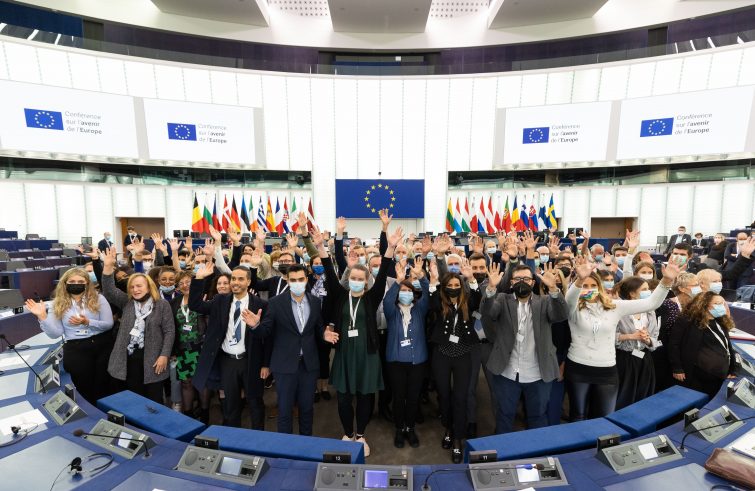
What happened, or, if you like, what will happen with the Conference on the Future of Europe? It was a year-long effort, from 9 May 2021 to 9 May this year, comprising countless meetings, dozens of proposals put forward by the citizens (through an online platform, focus groups, local debates, plenary sessions in Strasbourg) supported by EU institutions, to reform the EU, increase its effectiveness and bring it closer to its citizens.
It was a great opportunity, ceremoniously launched, suggesting that EU Parliament, Commission and Council had indeed heeded the requests arriving from the broader public. At a complex yet promising historical juncture, marked by the pandemic, war and recession,
Europe is being called to renew itself to meet the challenges of the changing times.
Geopolitical instability, fragile economies, climate change, demographics, the energy crisis, migration, social justice, the digital revolution: these are just some of the items requiring far-reaching transformations at EU level and within Member States.
The Conference had resulted in numerous proposals, including a Convention for reforming the EU, not excluding a – admittedly complex and not clear-cut – reform of the Treaties.
The European Parliament had seized the momentum. The EP plenary session of June 9 adopted a resolution calling for the European Council of June 23-24 to start the process to revise the EU Treaties that would set up a Convention, as “this would ensure that the EU takes action on the outcomes of the Conference as soon as possible and shows its will to respond to citizens’ demands for institutional reform.”
The inherent challenges of such an arduous path had hardly been denied in informal talks in Brussels and Strasbourg. Not least because the reform of the Treaties would eventually have to run the ratification gauntlet of the Member States, with vivid recollections of resolute oppositions, especially given the pervasive sovereignism of various political forces, shared by a large segment of the general public.
Last week’s European Council finally adopted its own position, summarised as follows in the summit’s Conclusions: “The European Council takes note of the proposals set out in the Report on the outcome of the Conference submitted to the three co-Presidents”, recognising that the Conference “has been a unique opportunity to engage with European citizens.” The key-passage: “An effective follow-up to this report is to be ensured by the institutions, each within their own sphere of competences and in accordance with the Treaties.”
Meaning…? The Conference was established under the auspices – and with the joint commitment – of the three EU institutions. So what is the reason for referring to their own “sphere of competence”?
It is meant to reaffirm that – to put it bluntly – the Council, which gathers the heads of state and government of all 27 EU countries, remains in charge of EU policy, while Parliament and Commission, the two most Community-oriented institutions, must play second fiddle? Does the phrase “in accordance with the Treaties” mean that the EU Treaties should be regarded as unalterable, despite the fact that in many respects they are “outdated”? Suffice it to mention the Conference’s (rightful) request to abolish unanimity voting in the Council on issues pertaining to foreign policy, taxation, welfare, accession of new member Countries. Or Parliament’s right of legislative initiative, hitherto the responsibility of the Commission.
The Conference’s proposals included the idea of a “permanent” follow-up of the debate between citizens and institutions, but the European Council made no mention of this.
Moreover, we must admit that the Conference on the Future of Europe has not been a primary concern for its 440 million citizens over the past 12 months.
And participation was limited to a few thousand people, although they seriously worked to relaunch the integration process in the changed circumstances we are experiencing today. In defence of the Council, home to all 27 heads of State and government, it should be said that EU leaders are facing serious and pressing problems, suggesting that EU reform could be put on hold for a while. Yet the huge challenges confronting Europe as a whole call for a quantum leap in European unity.
A confidential document attributed to the General Secretariat of the Council, circulated shortly after last week’s summit ( the contents of which were made available to SIR), suggests that the Czech presidency, holding the six-month mandate as of July 1, will kick start discussions on the Conference’s follow-up activities via General Affairs Council meetings. Furthermore, Commission President Ursula von der Leyen will reportedly present initiatives concerning the Conference on the Future of Europe in her forthcoming State of the Union address of September. The Commission is expected to ensure that the outcomes of the Conference on the Future of Europe are integrated into the Commission’s 2023 Work Programme. A Conference feedback-up event is planned in autumn 2022, an opportunity for Council, Parliament and Commission to keep citizens informed.
Last but not least, an additional observation with respect to the future path of the EU.
Indeed, it is becoming increasingly unlikely that a ”twenty-seven-party” agreement will produce significant developments. In this respect, the opportunity of “enhanced cooperation “- i.e. a stronger and more integrated group of countries progressing along the path of unity, open to new members, capable of proving to the other States that this path is practicable and useful (taking into account that enhanced cooperation has long been a reality, as in the case of the Euro currency) – should be reconsidered from a practical and forward-looking angle.
The EU (its institutions, its Member States, its peoples) finds itself at a historic juncture, much like others it dealt with in the past. It may either ‘seize the moment’ or indulge in an unfavourable muddle. The next steps will tell us which direction will actually be taken.









